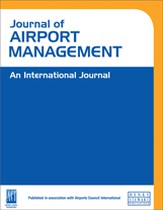5G mobile networks for airports: Supporting the digital transformation
Abstract
Major international airports are highly complex ecosystems with multiple stakeholders performing a large number of processes, many of them in the crucial path of aircraft, passenger, baggage and cargo handling, in the airside. The role of the airport operators is to orchestrate, synchronise, optimise and facilitate the efficient and effective execution of these processes. In this context, this paper explores and demystifies how the new advancements in 5G mobile networks can help airports succeed and understand the benefits that such technology might bring to the industry and what steps and investments need to be made to realise the full potential. The paper captures lessons learned from a 5G testbed deployed at Athens International Airport as part of the European Commission Horizon 2020 project, 5G-TOURS. It includes a description of new services and applications for airports that advanced wireless connectivity can provide. A quantitative analysis is provided of the potential benefits that an airport like Athens can expect to see from these new services. These are presented in terms of direct operational benefits and wider socio-economic benefits. Furthermore, the various strategies that an airport operator might adopt for the management, delivery and installation of wireless infrastructure in their specific setting are described and indicative costings in the example setting of Athens are provided. Overall, using Athens International Airport as a case study, the aim is to illustrate the pros and cons of various wireless strategies and considerations that airport operators need to make when selecting the best way forward for their business.
The full article is available to subscribers to the journal.
Author's Biography
Nikolaos Papagiannopoulos is a senior project manager, BSc IT, MSc IT, MBA holder, and a certified Project Management Professional (PMP). He has more than twenty years’ experience in managing large-scale IT projects at Athens International Airport and in consulting as an expert on international assignments in India, Eastern Europe, etc. Working in a mission-critical environment such as a 24-7 international airport, he has strong experience in data management methodologies and has designed and managed large-scale mission-critical projects. He has extensive knowledge in information management and he is responsible for the airport’s corporate and operational data management. He is a project manager of research and innovation for European Union (EU) funded projects (eg FP7, H2020) on behalf of the airport.
Julie Bradford received her First Class MEng degree in Electronic Engineering with Business Management from the University of York, 2002, and a Postgraduate Certificate in Business Management with a distinction from Bath University. She works at Real Wireless in techno-economic analysis to quantify coverage, capacity and user experience in wireless networks. Julie has been part of the Real Wireless team providing the commercial and socio-economic assessment of 5G network architectures within the European Commission 5G NORMA, 5G-MoNArch and 5G-TOURS projects. She has also advised city council clients on advanced wireless strategies and supported development of related Green Book Outline Business Cases. Previously, she was Communications Engineer at QinetiQ UK, consultant at PA Consulting UK and Senior Systems Engineer for Airvana UK.
Simon Fletcher has the overall technical responsibility across Real Wireless. He has spent the past 20 years working in the design and development of technical telecoms infrastructure. Beginning his career in technology demonstrators at Racal Radar Defence Systems, he moved to Telecoms Modus in 1999 to play a key role in the development of 3G products and in 2006 he established a core architecture team that helped develop the first generation of technology for 4G systems, culminating in a Steering Board position in the LTE SAE Trials Initiative (LSTI), a global forum with a mission to assure the early adoption of LTE. His lengthy participation in Common Public Radio Interface (CPRI) defining early C-RAN concepts brings great foresight to an important architectural element of emerging 5G architectures. Simon is a regular speaker at industry events and is chairman of the Cambridge Wireless Future of Wireless Conference Organising Committee and Small Cell SIG Champion. His long-standing association with the UK innovation eco-system, as a director of mVCE, member of the UK5G Advisory Board and the Innovate-UK ICT-KTN brings a wealth of knowledge to the application of strategic research through open innovation to accelerate product and service delivery. Simon's technical focus is on future cities, the application of 5G and Internet of Things (IoT) in industry verticals, with an event horizon towards 2030 and a sustainability strategy.
